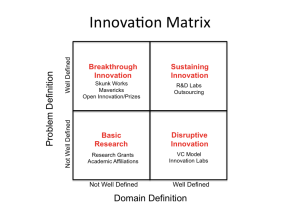I’m curious.
Is true innovation essentially a challenge to convention?
Can we ever affect significant progress without clear plan?
And, crucially, is the exploration of ‘the new’ always an intrinsically risky endeavor?
In life or in business, we view those that pursue markedly different paths as being either reckless mavericks or brave pioneers. Notably, we tend to differentiate such people not by their methods or motives but by their outcomes…
Did they achieve their intended goal? And perhaps more importantly, did they have a defined goal in the first place? It’s easy to believe that there’s little virtue in aimless exploration of the unknown. It’s unstructured and undisciplined.
It’s just indulgent. Unless you find something extraordinary.
 On his website DigitalTonto, Greg Satell stresses the importance of having a clear brief before embarking on a program of innovation. He states that defining the problem you seek to solve, its scope and its context, are factors that determine the nature (and by implication) the efficacy of innovative exploration. His insightful Innovation Quadrant splits activities with apparently simple criteria: Defined or Not Defined.
On his website DigitalTonto, Greg Satell stresses the importance of having a clear brief before embarking on a program of innovation. He states that defining the problem you seek to solve, its scope and its context, are factors that determine the nature (and by implication) the efficacy of innovative exploration. His insightful Innovation Quadrant splits activities with apparently simple criteria: Defined or Not Defined.
Much like Robert Frost’s much quoted poem The Road Not Taken, in which the author recalls deciding between two routes, Satell’s grid suggests that the choices we make about exploration are binary. Of course, in reality, things aren’t as black and white. What’s more, it’s simply not true to say that unless you arrive at a glorious conclusion, it’s been a wasted journey.
Surely those apparently fruitless meanderings, driven solely by curiosity can deliver real value through the discovery of new processes, skills and methodologies. A new outlook or approach might also later help you to discover something that most would consider a successful outcome.
More significantly, the merits of any specific approach and the extent to which you can justify exploration are largely dependent on a cost/benefit analysis. In addition to being aware of how well your objectives and goals are defined, it’s important to understand what the consequences might be if you fail to achieve them.
So, before you leave the path to explore, perhaps the most important question to ask is not “Where am I going?” or even “What are the chances of getting there?” but rather, “Can I find my way home before dark?”

